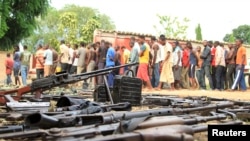Willy Nyamitwe, senior adviser to Burundian President Pierre Nkurunziza, tells VOA that images being broadcast around the world of crisis and violence in the capital, Bujumbura, are not current.
Those who have been firing shots at night and killing innocent people in the capital have been defeated, Nyamitwe said, and the situation is back to normal.
"We are still coping with [keeping an eye on] people who continue to kill innocent people and … they are from the opposition,” he said. “Those who are being arrested and disarmed are from the opposition."
The recent killing of three government officials were acts of terrorism and were designed to stir things up before a U.N. Security Council delegation's visit to the country Thursday, Nyamitwe said.
But Carine Kaneza, a member of the Burundian Diaspora who sat next to Nyamitwe during VOA's Straight Talk Africa program on Burundi, argued that facts on the ground contradict what the senior adviser expressed.
Kaneza, a member of Burundian Women and Girls for Peace and Security, an organization not recognized by her country, says many women continue to be victims of rape and thousands have fled and continue to flee to neighboring countries — a telling sign that the country is not at peace.
‘Alarm signals flashing red’
Numerous reports of gang rapes of women by security forces, torture, extrajudicial killings and reports of mass graves prompted U.N. human rights chief Zeid Ra'ad al-Hussein to recently warn that "all the alarm signals, including the increasing ethnic dimension of the crisis, are flashing red."
On Tuesday, U.S. State Department Spokesman Mark Toner called on the Burundian government to "permit an immediate, impartial investigation into these recent allegations."
But Nyamitwe insists there is a slander campaign underway that is being run by people who want to tarnish Burundi's reputation.
Kaneza says she finds it "a bit offensive to compare Burundi to other countries. The Burundian crisis is very distinct and has its own characteristics embedded within a Burundian problem."
She also says she doesn't understand the refusal by the Burundian government to welcome the 5,000 African Union troops in the country to help solve the current crisis.
"We have become what we didn't want to be 15 years ago. It's utterly unacceptable," Kaneza said.
But Nyamitwe insists there is no reason to send troops to a peaceful nation. He points out that the opposition has never wanted to vote in elections and, even after the people spoke with their vote for Nkurunziza, the opposition continues to make noise.
U.S. Ambassador to the United Nations Samantha Power told VOA before leaving for Burundi on Wednesday that "this is a crossroad for Burundi, they cannot let it be business as usual when you wake up in the morning and there is a corpse on the street as you try to get to work."
Power said the U.S. will push for accelerated mediation that should have taken place over months ago. She said an international force could be a force for stability rather than, as Nkurunziza sees it, a threat to the country's sovereignty.




